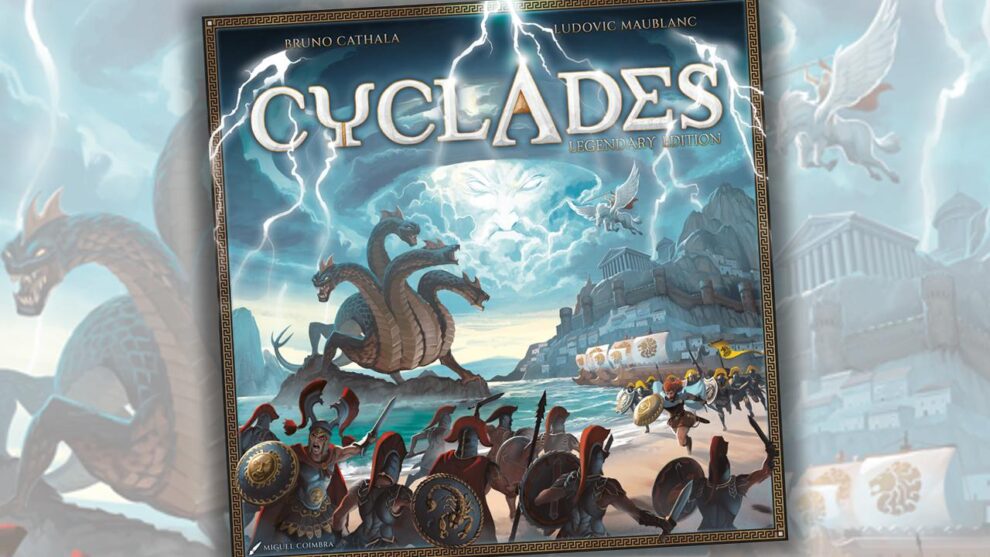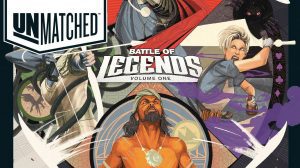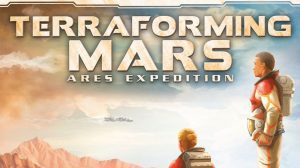Disclosure: Meeple Mountain received a free copy of this product in exchange for an honest, unbiased review. This review is not intended to be an endorsement.
Cyclades. If you’ve been in the board game trenches as long as I have, that name should stir up some memories. At first glance, the game appears like your typical “dudes on a map” genre where you move little dolls around and roll dice to see who wins fights. But Cyclades had one twist that set it apart: auctions.
You had to win auctions to do basic actions, whether it’s moving your ships or recruiting new soldiers. This easily understandable system made players feel as cunning and crafty as the gods themselves. For a moment, Cyclades held the spotlight and had two expansions. As time moved on, new games like Inis and Kemet stormed in, forcing Cyclades to retreat out of the public eye.
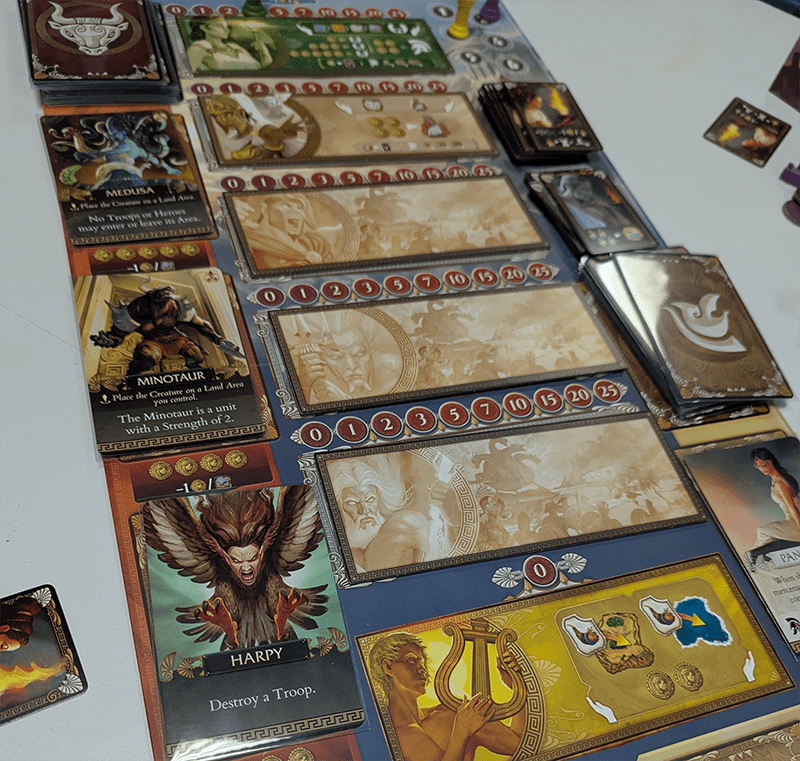
A Titan Returns
Now it is 2025 and in this wonderful wave of reprinting long-forgotten board games, Cyclades rises from its grave and howls for attention. However, this isn’t a mere reprint; it’s a remaster that promises streamlined gameplay and combines the best parts of both expansions into one consistent experience.
Does it work? The short answer is yes. Let’s get into the long answer.
Even though Cyclades might look like a Greek-themed version of Risk, it’s not about covering the map in your color. Instead, the goal is to control three metropolises by the end of a round. You can snag a metropolis by owning all four building types at once, collecting four Philosophers, or my personal favorite: taking one by force.
Each round, or “cycle” as the game likes to call it, starts out with the refresh of the tracks and gold income. After doing the maintenance, the focal point of the game comes in: The offering phase.
Auctions, Armies, and Ambition
The offering is where the auctions happen and mastering it is key to your success. Like any proper Greek god, they want devotion, and the best way to prove your devotion is to sacrifice your wealth. Each god grants a unique set of actions if you win their favor in the auction.
Do you want troops? Ares. Ships? Poseidon. Philosophers? Athena. Mercenaries and Heroes? Hera. Priests? Zeus.
If you cannot afford an auction or don’t want to participate, you can always go to Apollo. He grants you two coins and lets you place tokens for increased income, assuming the area hasn’t been taken over. The drawback is you are skipping your entire turn.
From there, turn order flows as simply as Zeus turning into a swan to ask someone out. Starting from the top and moving towards the bottom on the God track, players take their turns. Every god grants actions, provides a building, and opens the door to mythological creatures and heroic movement.
Each building has a simple ability that rarely needs more than a sentence to explain. Fortresses boost defending troops in combat. Harbors grant bonuses to the ships that control them. Temples provide discounts on mythological creatures, while Universities do absolutely nothing except they’re required to build a metropolis. I’d make a joke about that, but let’s be honest: you already did before finishing this sentence.
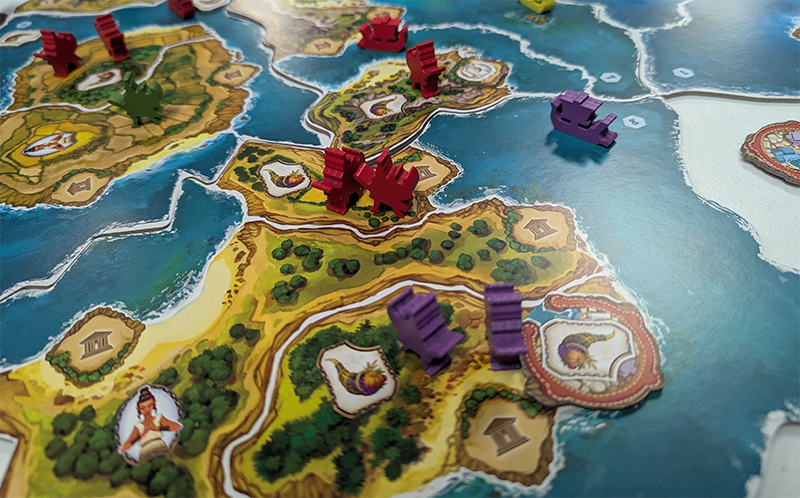
Release the Kraken…and Friends
Next to the God track are the mythological creatures. Spend some coin and they give you abilities. The vast majority of them are one-shot, meaning you do what the text says and toss it in the discard pile. A few of them provide some actual presence on the board, like the wonderful Kraken that destroys all ships in a sea space and makes it inaccessible to everyone.
Heroes are a tad special. You can only recruit them through Hera and they provide not only an ongoing bonus, but a sacrifice bonus. These sacrifice bonuses are an alternative way to get a metropolis, such as having a certain number of land areas or only requiring 2 pairs of 2 different building types. Another important function about them is they can move army units with them. Typically, you would need Ares to move, but Heroes let you break the usual rules, assuming you are ready to pay a premium for it.
Combat is, thankfully, not a complicated affair. Both you and the defender roll dice and add that number to the total units they have in the contested area. The losing player removes a unit, and the defending player has the opportunity to run away. If not, continue until one side remains. That’s it.
Obviously, there are a few extra details here and there, but this is the general outline of the game. Get your income, bid for a god, do the actions of said god, possibly get into a fight, and repeat until someone gets three metropolises.
Myth Meets Mechanics
Since this is a rebirth of an older title, the first question, like any child of the gods, is whether it surpasses its father. In true mythological fashion, the answer is yes. This version is more engaging and casts out many flaws of the original, such as the pacing and balance. The only thing the old version still holds in its favor? Miniatures, rather than meeples and standees. But 2008 was the age before inflation climbed Mount Olympus.
I’ve mentioned pacing, and while this new version improves on it, it still fumbles a bit. The first half of the game feels as swift as Dionysus after a feast. Since players have few coins in their purses, they can’t do much beyond winning auctions. They can’t leverage the additional actions the gods provide because the extra actions come at a hefty cost.
As the game progresses and the first metropolis rises, everything shifts. A single turn can reshape the board thanks to the influx of coins. More options mean more decisions, and more decisions mean more time. At higher player counts with especially methodical players, you might find yourself wishing Charon would ferry you out early.
I also need to point out that this game is a textbook case of zero-sum gameplay. Most of the time, gaining ground means taking someone out. You better not give pet names to your troops and ships, because you’ll be mourning for them a round later. Even the starting setup feels cursed, wedging you between two rivals on three fronts. Cyclades doesn’t ask what you’re willing to lose. It assumes the answer is “everything.”
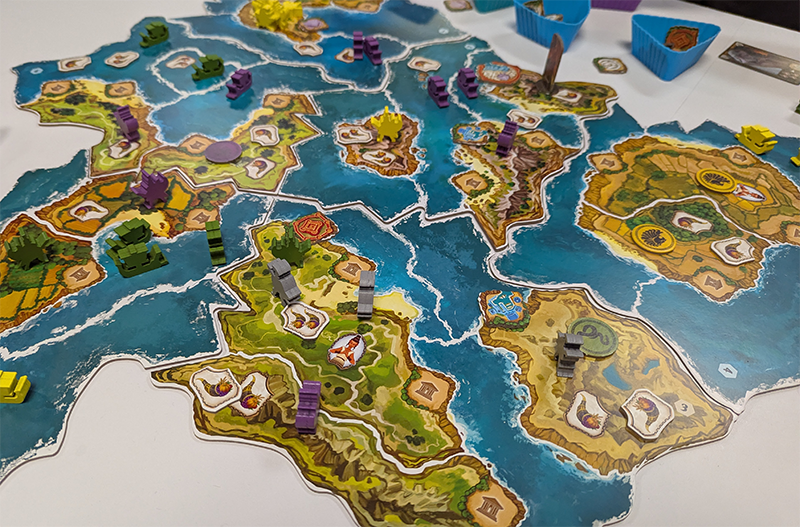
The Legend Lives On
And that is why I like this game. It is a breath of fresh air in a large sea of overly cautious modern board games. Maybe it’s just grumpy me talking, waving his future walking stick, but I’m so tired of games padded with high guardrails that no one ever feels the sting of a bad decision. It’s actually refreshing to feel punished for mistakes, and not at the absurd level of Food Chain Magnate or Barrage. You don’t need to be a mathematician to bounce back here.
Can I also talk about the auctions? It’s been around since 2008, and it’s still the best system. Absolutely timeless. The designer, Bruno Cathala, needs so many pats to the back for this one, even if it involves scraping a few layers off his skin. It easily outshines card drafting or trick-taking, offering more agency and a higher skill ceiling without becoming convoluted.
I’m pleased that combat hasn’t changed either. Far too many “dudes on the map” games have these silly combat systems that involve a forest full of pages to comprehend. Not here. If you can deal with arithmetic in single digits, you’re good. It’s simple enough to pick a fight just because you can. And honestly? That’s half the fun.
Who to Invite to the War
Another improvement over the original is the introduction of mandatory buildings. With the exception of Apollo, every god now forces you to place a building if you’ve got space for one. In other words, turtling is about as stable as Zeus’ love life. Sure, a duo or trio might promise peace for a few rounds, but like most pacts in Greek mythology, those alliances quickly turn into stepping stones once the buildings start to rise.
The only genuine complaint I have about this game, outside of previously mentioned pacing, is the player scaling. 4 or 5 players are peak, while 3 and 6 are questionable. At 3 players, only 2 gods out of the 5 are available per auction, excluding Apollo. This leads to an experience where once the god is off the track, you have to wait 3 rounds for it to come back. To say the least, it turns the game into a crawl. At 6 players, you are forced to do 2 vs 2 vs 2 teamplay, which only adds to the already noticeable downtime. Since I’ve mentioned the teamplay, it’s actually pretty decent and I would recommend 2 vs 2 every once in a while.
But like any tale from Olympus, even flawed heroes can become legends. Cyclades: Legendary Edition isn’t just a remaster. It’s a reminder. A reminder that player conflict, hard decisions, and clever auctions can still feel thrilling over a decade later. It’s not perfect, but it doesn’t need to be. It’s sharp, mean, and clever. Just like the gods intended.


